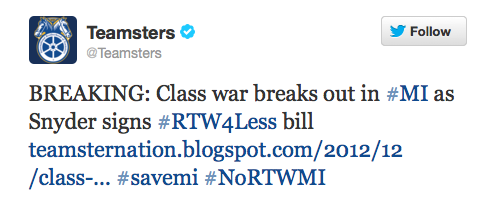Yesterday Teamsters Union President Jimmy Hoffa called for a civil war in Michigan over new right-to-work legislation that allows workers to decide whether or not they want to join a labor union. The Teamsters' official Twitter account called Michigan Governor Richard Snyder's move to sign the bill into law the start of a class war in the state.
Jimmy Hoffa must be forgetting about his own personal class war against his own union workers. Hoffa made nearly $300,000 in 2010. With benefits, Hoffa made nearly $400,000. The average salary for union workers is $48,776 according to the Labor Department.
In 2011, among full-time wage and salary workers, union members had median usual weekly earnings of $938.
When Hoffa was confronted about his large salary last year, he called for more taxes.
In an interview with Teamsters Union leader Jimmy Hoffa, for example, the Big Government writer Christian Hartsock recently exposed the glaring hypocrisy of public sector union bosses. When asked if he would be willing to take a pay cut to redistribute his earnings to the due payers he ostensibly represents – Jimmy Hoffa makes at least $300,000 a year – his response was rooted in classic liberal ideology.
“Well, I think, the answer is we got to have more taxes on people," he said. "I think we ought to raise the taxes on the rich people in this country. And I think everybody should do that. And I think we should have more taxes. And let’s make sure that everybody has equality of sacrifice and we should be paying more taxes just like Warren Buffet.”
More on the growing wealth gap between union bosses like Hoffa and union workers pre-auto bailout from The Detroit News:
Recommended
In the past five years, pink slips have descended upon tens of thousands of union workers in Michigan, while others have seen their health care and pension benefits gutted and wages frozen or cut.
But in many cases, labor's pain stops at the union hall door.
During the toughest economic times for organized labor in decades, union leaders are more likely to keep their jobs and get raises than the members they serve. A Detroit News analysis of U.S. Department of Labor data revealed a growing pay divide between labor bosses and the rank and file who pay their salaries with their dues.
Michigan's biggest unions represented 60,000 fewer workers in 2006 compared with 2002. While membership plummeted 14 percent, jobs at union halls remained safe, dropping less than 1 percent.
Workers who kept their jobs saw the disparity between their paychecks and those of their union bosses grow. The pay gap between the state's 50 top-paid labor leaders and union workers has grown by $18,000 since 2002 -- an economic chasm expanding by almost $10 a day. Records supplied to the Labor Department by the unions themselves show that the state's 50 top-paid union officials now earn an average of $186,000. More than 1,000 labor officers and staffers in Michigan made more than $100,000 in 2006, more than twice as much as the average union worker.
Union leaders and members have long complained about the millions paid to CEOs in salaries and perks. For instance, Alan Mulally, president and CEO of Ford Motor Co., was paid more than $28 million last year -- that's over 450 times more than the average line worker at the company. And Michigan's top corporate titans had their average pay more than double since 2001, The News reported in May.
Less known to the public -- and to many union members -- is the growing pay gap within many unions.
In 2006, the highest-paid union official in Michigan was Grosse Pointe Park's Walter "Ralph" Mabry, the former executive secretary-treasurer of the Michigan Regional Council of Carpenters. He was paid more than $410,000 last year -- up $26,000 from the year before. That's a 6.7 percent pay hike at a time when his union lost 5 percent of its members, records show.
The Teamsters are crying about a new class war while their leader wages a class war of his own on the people he claims to represent.



